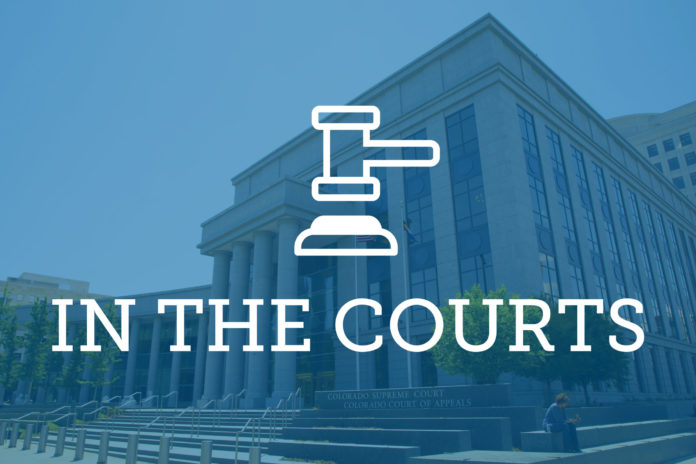
Editor’s Note: Law Week Colorado edits court opinion summaries for style and, when necessary, length.
The Colorado Court of Appeals unanimously affirmed a judgment connected to the juvenile transfer statute.
Johnny Dennel, Jr., a juvenile, appealed his conviction after he pleaded guilty to manslaughter in district court. Dennel was charged in juvenile court for a delinquent act that if committed by an adult, would be a second-degree murder charge.
On the date of the alleged offense, Dennel was 15 years old and didn’t have prior felony adjudications or convictions. On a prosecutor’s motion and after a contested hearing, a juvenile court waived its jurisdiction and transferred Dennel’s case to the district court for adult criminal proceedings. After pleading guilty to manslaughter Dennel was sentenced as an adult.
Dennel appealed, arguing he wasn’t statutorily eligible to have his case transferred from juvenile court to district court because he didn’t have prior felony adjudications. Dennel relied on the Colorado Court of Appeal’s 2015 ruling in People v. Nelson and contended under Colorado Revised Statute 19-2.5-802(1)(a)(I)(B), a child his age charged with a felony needs to have previous delinquency adjudication for a felony before a juvenile court can transfer the case to the district court.
Dennel further argued that because he didn’t have a prior felony adjudication, the juvenile court erred in transferring the case and the district court never had jurisdiction over him.
The appeals court concluded the plain meaning of the transfer statute doesn’t condition transfer eligibility on previous delinquency adjudication. The appeals court ruled Dennel was eligible for transfer and affirmed the judgment.
The appeals court unanimously affirmed in part, reversed in part and remanded a case involving trespassing.
According to court records, in 2019, Reginald Snelling was drinking alcohol and spending the day with his friend Thomas Rogers at Rogers’ apartment and later that night some of Rogers’ friends came by. The opinion states everyone there consumed alcohol, marijuana or both.
Court records report at one point Snelling was behaving inappropriately with some of the girls and was told to leave. Snelling left and came back saying he lost his keys and cell phone. Rogers said he would look for the keys and phone, but Snelling couldn’t come inside. Rogers couldn’t find them and when Snelling was told that, Snelling was accused of trying to force his way inside. Snelling was eventually arrested and accused of spitting in a patrol car.
Snelling appealed his conviction of second-degree burglary, first-degree criminal trespass and second-degree criminal tampering. Snelling and the prosecutors agreed the criminal trespass conviction should be merged into the burglary conviction and the appeals court concurred. The appeals court reasoned the Colorado Supreme Court’s decision in People v. Garcia was overruled by other high court decisions clarifying the doctrine of merger.
From this, the appeals court reversed his convictions for second-degree burglary and second-degree criminal tampering and remanded for a new trial for those charges. The division also found the trial court didn’t answer the jury’s question about the effect of voluntary intoxication for those offenses.
Records state after deliberations began, the jury asked the court “Can you be so inebriated that you are unable to form intent?” The lower court told the jury they must consider the instructions as given.
The appeals court argued settled law indicates voluntary intoxication could have negated Snelling’s ability to form specific intent regarding the burglary and tampering offenses and the trial court should have clarified the voluntary intoxication issue before the jury.
The appeals court affirmed his trespassing conviction is subject to a merger if Snelling is again tried and convicted of second-degree burglary.
MLS Properties, et al. v. Weld County Board of Equalization, et al.
The appeals court unanimously reversed and remanded a case involving property tax assessments.
Real property value for property tax assessments is calculated every two years in Colorado. A county assessor determines the value of a property which takes effect Jan. 1 of odd-numbered years. Generally, a property’s value is carried over to even-numbered years and can only be modified under three circumstances: correcting a clerical error or omission, correcting an incorrect value or adjusting for an unusual condition affecting a property.
The plaintiffs, 55 Weld County commercial property owners and taxpayers, filed an action in district court after trying administrative remedies as they protested their 2020 property valuations. The taxpayers alleged two unusual conditions occurred under section 39-1-104(11)(b)(I) that required the assessor to revalue their properties for the 2020 tax year. Namely the COVID-19 pandemic being detrimental in nature and various governmental orders responding to the pandemic restricted the use of their land.
The Weld County Board of Equalization and Weld County Assessor Brenda Dones moved to dismiss under C.R.C.P. 12(b)(5), failure to state a claim upon which relief can be granted. The district court granted the motion explaining the taxpayers claims were non-specific and conclusory, and as a matter of law, the pandemic and resulting orders occurred too late to be considered for the 2020 valuations.
The appeals court reversed concluding under section 39-1-104(11)(b)(I) the assessor is required to consider unusual conditions that occur during any point during the even-numbered calendar year of a reassessment cycle, not just those existing before Jan. 1 of the even year. The appeals court also concluded the complaint was specific enough to survive a C.R.C.P. 12(b)(5) motion for dismissal.
The appeals court further surmised the record is insufficient to conclude whether the pandemic or governmental orders were unusual conditions requiring the revaluation of properties for taxes. That question should be answered after more proceedings to develop the record, the court ruled.
The appeals court reversed the judgment and remanded to the district court to reinstate the amended complaint and conduct more proceedings consistent with the opinion.

